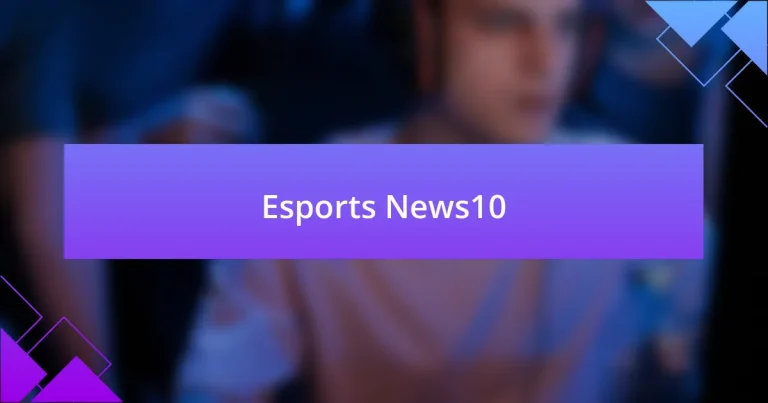The article provides an in-depth analysis of the most memorable matches in League of Legends history, highlighting key events such as the 2013 and 2017 World Championship Finals, and the 2018 Mid-Season Invitational Final. It defines what constitutes a memorable match, focusing on high stakes, unexpected outcomes, and significant player performances. The article evaluates the criteria for memorability, the influence of player performances on match significance, and the impact of these matches on the League of Legends community and competitive landscape. Additionally, it discusses how memorable matches shape player legacies and career trajectories, offering insights into best practices for teams and players based on historical performances.

What are the Most Memorable Matches in League of Legends History?
The most memorable matches in League of Legends history include the 2013 World Championship Final between SK Telecom T1 and Samsung Blue, the 2017 World Championship Final featuring Samsung Galaxy against SK Telecom T1, and the 2018 Mid-Season Invitational Final where Invictus Gaming faced Fnatic. These matches are notable for their high stakes, exceptional gameplay, and dramatic moments that captivated audiences worldwide. For instance, the 2017 World Championship Final is remembered for Samsung Galaxy’s comeback against SK Telecom T1, culminating in a 3-0 victory that showcased their strategic prowess and teamwork.
How do we define a memorable match in League of Legends?
A memorable match in League of Legends is defined by its high stakes, unexpected outcomes, and significant player performances that resonate with the community. Matches that feature dramatic comebacks, pivotal team fights, or record-breaking plays often become iconic, as seen in the 2017 World Championship final where Samsung Galaxy defeated SK Telecom T1, showcasing exceptional skill and strategy. Such matches not only impact the tournament’s outcome but also leave a lasting impression on fans, contributing to the game’s narrative and history.
What criteria are used to evaluate the memorability of a match?
The criteria used to evaluate the memorability of a match include the significance of the stakes, the level of competition, the presence of dramatic moments, and the impact on the game’s history. Matches that have high stakes, such as championship finals or pivotal playoff games, tend to be more memorable due to their importance. Additionally, the intensity of the competition, characterized by close scores and back-and-forth gameplay, enhances memorability. Dramatic moments, such as unexpected comebacks or game-changing plays, also contribute significantly to a match’s lasting impression. Finally, the overall impact on the game’s history, including how it influences future matches or player legacies, solidifies a match’s memorability. For instance, the 2017 World Championship final between Samsung Galaxy and SK Telecom T1 is often cited for its high stakes and dramatic gameplay, making it a landmark event in League of Legends history.
How do player performances influence match memorability?
Player performances significantly influence match memorability by creating defining moments that resonate with fans and shape the narrative of the game. Exceptional individual plays, such as a game-winning pentakill or a crucial save, can elevate a match from ordinary to unforgettable, as seen in the 2017 World Championship final where Samsung Galaxy’s Ruler delivered a standout performance that secured their victory. These moments not only enhance the excitement of the match but also contribute to the legacy of the players involved, making their performances a key factor in how matches are remembered over time.
What impact do memorable matches have on the League of Legends community?
Memorable matches significantly enhance the League of Legends community by fostering engagement and creating lasting narratives. These matches often become reference points for discussions, analysis, and fan theories, which deepen community involvement. For instance, the 2017 World Championship final between Samsung Galaxy and SK Telecom T1 drew over 100 million viewers, illustrating how high-stakes games can unite fans and elevate the competitive scene. Additionally, iconic moments from these matches, such as unexpected comebacks or standout performances, contribute to the lore of the game, encouraging new players to join and existing players to remain invested.
How do these matches shape the competitive landscape?
Memorable matches in League of Legends significantly shape the competitive landscape by influencing team strategies, player reputations, and fan engagement. For instance, the 2016 World Championship finals between SK Telecom T1 and Samsung Galaxy showcased innovative strategies that teams adopted in subsequent tournaments, altering the meta. Additionally, high-stakes matches elevate player profiles, as seen with Faker, whose performance in pivotal games has solidified his status as a top player, impacting recruitment and team dynamics. Furthermore, these matches enhance fan engagement, driving viewership and sponsorship opportunities, which in turn affects the financial viability of teams and leagues.
What role do memorable matches play in fan engagement?
Memorable matches significantly enhance fan engagement by creating lasting emotional connections and fostering community among viewers. These matches often feature dramatic moments, unexpected outcomes, and high stakes, which resonate deeply with fans, leading to increased viewership and social media interaction. For instance, the 2017 World Championship final between Samsung Galaxy and SK Telecom T1 drew over 100 million viewers, showcasing how pivotal matches can amplify fan interest and participation. Such events not only solidify loyalty but also encourage fans to share their experiences, further enriching the community and driving ongoing engagement with the sport.

Which Matches Stand Out as the Most Memorable?
The matches that stand out as the most memorable in League of Legends history include the 2013 World Championship Final between SK Telecom T1 and Samsung White, and the 2017 World Championship Final featuring Samsung Galaxy against SK Telecom T1. The 2013 final is notable for its intense gameplay and strategic depth, culminating in a 3-0 victory for Samsung White, which showcased their dominance. The 2017 final is remembered for Samsung Galaxy’s redemption arc, defeating SK Telecom T1 3-0, marking a significant moment in esports history as it ended SKT’s reign and highlighted the competitive evolution of the game. These matches are frequently referenced in discussions about pivotal moments in League of Legends due to their high stakes and the impact they had on the professional scene.
What are the top five most memorable matches in League of Legends history?
The top five most memorable matches in League of Legends history are:
-
SK Telecom T1 vs. Samsung White (2014 World Championship Finals) – This match is renowned for SKT’s dominant performance, culminating in a 3-1 victory that solidified their legacy in esports.
-
Fnatic vs. EDward Gaming (2017 World Championship Group Stage) – Fnatic’s comeback from a significant deficit to win the match exemplified their resilience and strategic prowess, making it a highlight of the tournament.
-
G2 Esports vs. FunPlus Phoenix (2019 World Championship Finals) – G2’s unexpected 3-0 sweep over FPX showcased their innovative playstyle and marked a significant moment in European League of Legends history.
-
Cloud9 vs. EDward Gaming (2017 Mid-Season Invitational) – This match is memorable for Cloud9’s upset victory, which demonstrated the potential of North American teams on the international stage.
-
T1 vs. DAMWON Gaming (2020 LCK Summer Split) – This match is notable for its intense back-and-forth gameplay, culminating in a nail-biting finish that highlighted the skill levels of both teams.
These matches are celebrated for their high stakes, dramatic moments, and the impact they had on the competitive scene.
What made the 2017 World Championship Final unforgettable?
The 2017 World Championship Final was unforgettable due to its intense competition and the dramatic storyline of Samsung Galaxy’s redemption against SK Telecom T1. Samsung Galaxy, having lost to SK Telecom T1 in the previous year’s final, showcased exceptional teamwork and strategy, ultimately winning the series 3-0. This victory marked Samsung’s first World Championship title and solidified their place in League of Legends history, as they overcame the reigning champions in a dominant fashion, demonstrating skill and resilience.
How did the 2016 Mid-Season Invitational change perceptions of competitive play?
The 2016 Mid-Season Invitational significantly changed perceptions of competitive play by showcasing the high skill level and strategic depth of international teams. This tournament highlighted the dominance of teams like SK Telecom T1, who not only won the event but also demonstrated superior teamwork and innovative strategies that set new standards for competitive play. The matches featured intense rivalries and unexpected outcomes, such as the strong performance of the underdog team, EDward Gaming, which captivated audiences and emphasized the unpredictability of high-stakes matches. The overall production quality and viewership numbers, with millions tuning in, further solidified the event’s impact on the global esports landscape, elevating the status of League of Legends as a premier competitive title.
What are some lesser-known but impactful matches?
Some lesser-known but impactful matches in League of Legends history include the 2014 IEM World Championship match between Samsung Blue and NaJin White Shield, which showcased strategic depth and individual skill, ultimately influencing the meta. Another significant match is the 2015 LPL Spring Split final where EDward Gaming faced off against LGD Gaming; this match highlighted the rise of EDG as a dominant force in the Chinese scene. Additionally, the 2016 EU LCS Spring Split match between G2 Esports and Fnatic marked a turning point for G2, establishing them as a top contender in Europe. These matches, while not as widely recognized, contributed to the evolution of competitive play and team dynamics in League of Legends.
How did the 2015 LCS Spring Split affect team dynamics?
The 2015 LCS Spring Split significantly impacted team dynamics by introducing a highly competitive environment that emphasized teamwork and communication. Teams like Team SoloMid and Counter Logic Gaming showcased improved synergy, leading to more strategic plays and coordinated team fights. The split’s intense competition resulted in roster changes and adaptations, as teams sought to enhance their performance, which further influenced their internal dynamics. For instance, the success of Team SoloMid, who finished first in the regular season, highlighted the importance of cohesive team strategies and effective communication among players, ultimately shaping the way teams approached their gameplay and collaboration in subsequent splits.
What lessons were learned from the 2014 All-Star Paris match?
The 2014 All-Star Paris match highlighted the importance of adaptability and teamwork in competitive gaming. Teams demonstrated that successful strategies could evolve mid-game, as seen when the North American team adjusted their tactics to counter the European team’s aggressive playstyle. This adaptability was crucial in securing victories, emphasizing that flexibility in strategy is vital for success in high-stakes matches. Additionally, the match showcased the significance of communication among team members, as effective coordination led to successful execution of complex plays, reinforcing that strong teamwork is essential in achieving victory in League of Legends.

How Have Memorable Matches Influenced the Evolution of League of Legends?
Memorable matches have significantly influenced the evolution of League of Legends by shaping gameplay mechanics, competitive strategies, and community engagement. For instance, the 2013 World Championship final between SK Telecom T1 and Samsung Blue showcased innovative strategies that led to the introduction of new champion balances and gameplay adjustments. Additionally, the iconic match between Fnatic and EDward Gaming in the 2015 Mid-Season Invitational highlighted the importance of teamwork and communication, prompting developers to enhance features that support these aspects in-game. These pivotal moments not only captivated audiences but also drove the game’s continuous adaptation to player feedback and competitive trends, ensuring its growth and relevance in the esports landscape.
What strategies emerged from iconic matches?
Strategies that emerged from iconic League of Legends matches include coordinated team fights, effective map control, and adaptive drafting. For instance, during the 2016 World Championship, SK Telecom T1 showcased the importance of vision control and objective prioritization, leading to their victory against Samsung Galaxy in the finals. This match highlighted how securing key objectives like Baron and Dragon can shift the momentum of the game. Additionally, the use of unconventional champion picks, such as the support role being filled by champions like Zilean, demonstrated the effectiveness of surprise tactics in high-stakes scenarios. These strategies have since influenced team compositions and gameplay approaches in subsequent tournaments.
How did these strategies change the meta in subsequent seasons?
Strategies employed in memorable League of Legends matches significantly influenced the meta in subsequent seasons by introducing new champion picks, item builds, and gameplay tactics. For instance, the rise of unconventional picks, such as support champions in the jungle role, prompted developers to adjust champion balance and itemization, leading to a more diverse champion pool in competitive play. Additionally, strategies that emphasized early game aggression shifted the focus of team compositions, encouraging teams to prioritize early-game champions and objectives, which became a staple in later seasons. This evolution in gameplay not only altered team dynamics but also shaped the overall competitive landscape, as teams adapted to these changes to remain viable in the meta.
What innovations in gameplay can be traced back to memorable matches?
Innovations in gameplay that can be traced back to memorable matches in League of Legends include the introduction of the “Baron steal” strategy and the use of “split pushing.” The Baron steal became prominent during the 2013 World Championship when teams like SK Telecom T1 executed high-risk plays to secure the Baron Nashor, leading to a shift in how teams approached objective control. Split pushing gained traction during the 2015 season, particularly showcased by players like Faker, who utilized this tactic to create pressure on the map, forcing opponents to respond and opening opportunities for their team. These strategies have since influenced the meta and shaped competitive play, demonstrating the lasting impact of these memorable matches on gameplay innovation.
How do memorable matches contribute to player legacies?
Memorable matches significantly enhance player legacies by showcasing their skills and impact during critical moments in competitive play. For instance, a player’s performance in a high-stakes match can lead to recognition as a top-tier competitor, influencing their reputation and career trajectory. Historical examples include Lee “Faker” Sang-hyeok’s pivotal role in the 2013 World Championship, where his exceptional gameplay helped secure victory for SK Telecom T1, solidifying his status as a legendary player in League of Legends history. Such matches not only highlight individual talent but also contribute to the narrative of a player’s career, making them memorable in the eyes of fans and analysts alike.
What impact do these matches have on a player’s career trajectory?
Memorable matches in League of Legends significantly influence a player’s career trajectory by enhancing their visibility and marketability. High-stakes games often lead to increased fan engagement and sponsorship opportunities, as players who perform well in these matches are more likely to be recognized by teams and organizations. For instance, players like Faker and Uzi gained international fame and lucrative contracts following standout performances in pivotal matches, illustrating how success in key games can propel a player’s career to new heights. Additionally, consistent performance in memorable matches can lead to invitations to prestigious tournaments, further solidifying a player’s reputation and career longevity in the competitive scene.
How do fans remember players based on their performances in key matches?
Fans remember players based on their performances in key matches through emotional connections and memorable moments that define their careers. For instance, a player’s exceptional performance in a championship match, such as a decisive pentakill or a game-winning play, often becomes a defining highlight that fans recall vividly. Statistics also play a role; players who consistently perform well in high-stakes situations, like finals or playoffs, are often celebrated for their clutch abilities. Historical examples include Faker’s iconic plays during the 2013 World Championship, which solidified his status as a legendary player in League of Legends history. These performances create lasting impressions, leading fans to associate specific players with unforgettable moments in the game’s narrative.
What can we learn from the most memorable matches in League of Legends?
The most memorable matches in League of Legends teach us about strategic adaptability, teamwork, and the impact of individual player performance. For instance, the 2016 World Championship final between SK Telecom T1 and Samsung Galaxy showcased how SKT adapted their strategies mid-game, ultimately leading to their victory. This match highlighted the importance of communication and synergy among team members, as well as the ability to pivot tactics based on the evolving game state. Additionally, individual performances, such as Faker’s exceptional play, demonstrate how a single player’s skill can influence the outcome of high-stakes matches. These elements collectively illustrate the complexity and depth of competitive League of Legends.
How can teams prepare for high-pressure situations based on past matches?
Teams can prepare for high-pressure situations by analyzing past matches to identify successful strategies and mistakes. By reviewing gameplay footage, teams can pinpoint critical moments where pressure affected decision-making, allowing them to develop mental resilience and tactical adjustments. For instance, during the 2017 World Championship, teams that studied the high-stakes matches of previous tournaments, such as the 2016 finals, were able to adapt their strategies and improve their performance under pressure. This historical analysis helps teams understand the psychological aspects of competition, enabling them to simulate high-pressure scenarios in practice and enhance their overall readiness for similar situations in future matches.
What best practices can players adopt from these memorable moments?
Players can adopt several best practices from memorable moments in League of Legends history, including strategic adaptability, effective communication, and mental resilience. Strategic adaptability is crucial, as players must learn to adjust their tactics based on the evolving dynamics of a match, similar to how teams have turned around seemingly lost games by changing their approach. Effective communication among team members enhances coordination and decision-making, as evidenced by successful teams that consistently share information and strategies during high-pressure situations. Lastly, mental resilience is vital; players should cultivate the ability to remain focused and composed, even when facing setbacks, as demonstrated by teams that have come back from significant deficits to secure victory. These practices are essential for achieving success in competitive gaming environments.















